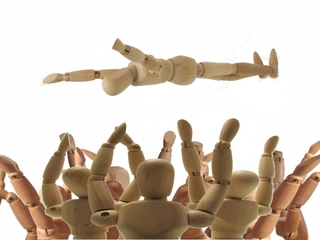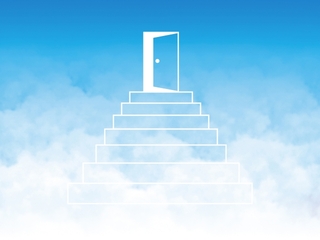Collection: CELEBRITY
Being a "celebrity" can be a source of suffering in itself.
Some people slander and criticize you just for being a "celebrity."
Don't yield to such online slander and criticism from the public and the media.
Suicide will only increase your suffering and will not make you feel better.
Moreover, it will make many of your fans sad.
First of all, please take a slow, deep breath and read each of the words written here.
May a ray of hope shine into your heart.
From the teachings of Master Ryuho Okawa,
I have selected prescriptions for the mind that focuses on "the suffering specific to entertainers and celebrities."
Competition is fierce in any field, and many mistakes happen

In society, certain jobs offer dreams, such as entertainers, professional athletes, professional shogi (Japanese chess) players, novelists, and artists.
Those who make it big appear to have brilliant, attractive lives. Some novelists become popular and make a fortune, but such people are quite rare. The probability of becoming a popular author is definitely much less than that of being a successful salaried employee.
Becoming an artist that can sell paintings with million-dollar price tags would require luck so extreme that it would be like surviving all nuclear bombs exploding everywhere without suffering harm.
Competition is fierce in the entertainment business as well. Many are forced to work for low pay, and sometimes must do any job given to them, including ones they loathe.
People tend to only see the bright side, but competition is very fierce in any field, and many people fail.
Therefore, it is a big mistake to set your final destination at the level that average people generally consider a “success.” Whether you can take an extra step forward will, in fact, be the crossroad of your life.
What does it take to advance one step forward? That is the aforementioned mental attitude, or mindset. There is a time when you have to focus your energy to learn from failures in life and turn them into positive experiences.
In study or work, when you start out something new, you will actually experience a lot of failures. It is such times when you can see a big difference between those who have received life lessons and mastered how to live through difficult times, and those who have not.
From “Healing from Within” by Ryuho Okawa
A rival could be seen as a mirror reflecting your appearance
Looking back over my experiences, though, those who were my rivals or enemies from school or work had surprisingly accurate eyes, which is formidable.
In other words, no one evaluates your talent more accurately than those who have appeared as your enemies. The evaluations given by allies or friends are relatively naïve. People who appear clearly as your enemies know you better. Not only do they know your current talents and abilities well, but also what you may become in the future.
So, the more they think that you will become someone great in the future, be successful or reach very high levels, the more determinedly they will attack you. Such prophetic abilities are at work.
Hence, when people who seem to be your rivals or enemies appear, please observe them closely. Observe and evaluate objectively their abilities, personalities and future prospects. In addition, if a rather impressive person, that is, someone whom you regard as talented or popular, considers you to be their rival or is jealous of you, there is a high probability that you have more talent and ability than you think.
You can get a clear understanding of yourself by looking at what kind of people are appearing as your enemies. Rivals are like a faithful mirror as they are an exact reflection of you. To put it simply, it means that you are currently at a level that is making your enemy fiercely jealous of you and competitive.
Those who appear as your rivals will not be happy with your success. They are hoping to prevent you from achieving success, so you must not cater to the subjective circumstances that a rival is hoping for. You must continue on your own path.
At such times, it is important not to base your feeling of success so much on winning the competition against your rivals and enemies. It is important that you concentrate on realizing your own ideals and focus on going along your own path.
Also, if someone does appear as your rival, you should do your best to judge their abilities, strengths and weaknesses as fairly as possible, and from an impartial standpoint.
Acknowledging the strengths and talents even of your enemies, as well as learning what you can from them, will definitely help in making you grow. You must have this sort of attitude.
From “The Laws of Future” by Ryuho Okawa
To continue to be successful, you must be prepared for the art of "being cheered on at first, then shot down later"

There is a technique that the media specializes in called "yoisho-drop," where you are cheered on at first and shot down later. When you are subjected to this for the first time, you fall for the trap because you are not prepared for it.
In other words, it is a technique of being lifted up at first as much as possible and then being hit and then dropped. In this way, the media can write and broadcast articles on both sides of a person.
In short, they will "raise you up at first, then lower you down later," and many personalities disappear because of this. It is not common for people to have a countermeasure for this before they become famous.
On the other hand, those who have already had some experience before have the skills to deal with the situation in some form.
Those people who have experienced it before are cautious when being cheered and "ride carefully" in that phase, and when being hit, they learn how to "pass it off well" by bearing up and avoid taking the blow too hard.
The first blow is often difficult to dodge, but whether or not you can continue on the path to success depends on whether or not you can dodge it.
If the person is unable to dodge the attack and sinks to the bottom of the sea and is knocked down, there is little chance of his or her coming back to the surface. They will be forgotten and become "people of the past". There are many such people every year.
There are plenty of people who were famous 10, 20 years ago, or even earlier, who are now fading from people's memories. Many are becoming people of the past.
There are cases where a person becomes famous but people eventually become bored with them and is discarded, and there are other cases where a person becomes famous but is knocked down by people who say, "Actually, there are such and such bad points" or "There are such and such failures," and his or her reputation becomes so bad that they gradually become unable to appear and disappears. These are the two main patterns.
In any case, it is true that various factors, such as the atmosphere of the time, influence how one is treated by people. However, how one survives and thrives in such an environment depends largely on one's own personal strength.
I feel that without learning these skills, it will be very difficult to continue to be successful.
From "Rules for a Rich Mind," by Ryuho Okawa.
Example 1: Do not see articles written about you
Ichiro, for example, makes a point of never reading features or news articles about himself — because if he did, they would certainly affect his mood.
He’s explained that, while there are certain stories that are impossible to avoid, in general he avoids articles and news reports about himself because he doesn’t want them to influence his next performance. He’s also said that, in any case, he has no interest in how he’s portrayed. I understand how he feels. It’s a question of psychology — to keep his focus on the game, he makes a concerted effort to avoid everything that’s been printed about him.
Of course, most of Ichiro’s press is positive, but when he is not playing his best journalists can be critical of him, and reading about his bad performances will just pull him deeper into that slump. It’s as simple as that.
Ultimately, you just need to figure out what works best for you. Everyone has to figure this out in their own way, but if we look at people who are accomplishing truly extraordinary things, we always find the common elements of devotion and diligence. And while some successful people are very good at taking on criticism and advice, there are many who have the conviction to forge ahead without paying any heed to what others have to say.
From “Work Skills for Surviving the Recession” by Ryuho Okawa
Example 2: Accepting it as a "famous tax" and using it as a "springboard" to take a leap forward
As some of you may have read, a book titled "The Autobiography of Trump" has been published. It is the autobiography of Donald Trump, an American real estate tycoon who, at the age of 42 or 43, has amassed an incredible fortune and is on the verge of becoming president of the United States, and the most skilled real estate tycoon in New York City (Note: Trump actually won the 2016 presidential election and became the 45th President of the United States.)
In this autobiography, he says some interesting things. He had made a lot of enemies because he was too clever, and he has been criticized by others. He has been criticized by newspapers. However, he says in his book that the criticism in the newspapers was indeed hard on him, but the more the newspapers wrote bad things about him, the more his business flourished.
He said that whether the content was good or bad, at least having the name Trump on the front or second page of a newspaper was a tremendous plus for his subsequent business. So, "Don't be afraid," he wrote, "whatever they write about you, if they make you famous, you can make a profit." It is an interesting way of thinking.
I believe that people who are able to think this way have the confidence behind their thinking to overcome all kinds of criticism. They have confidence in their own achievements, and they have a strong spring in their mind. They have strong legs and backs. No matter what the criticism is, he thinks, "Oh, this is a tax on my fame," and he goes right up to the top. He has been fighting with the mayor of New York City, etc., openly criticizing them, and using that as leverage to go on and on and on. He is an interesting character. I thought he was pretty good, but there are people like that.
From "Invincible Thinking" by Ryuho Okawa
Example 3: Thinking other than "yes or no"
There was a prime minister who resigned after only sixty-odd days because of an affair with a woman that was exposed. It is a very shameful story. Even if he thought he would have to quit sooner or later, he should have at least persisted once. I thought, "Why don't you just blurt out something like, 'My only fault is that I have a deep love for women,' at least once?" I still feel that he should have just given it a try. It's just too pathetic. Two generations of prime ministers like that, with money and women's scandals, is really pathetic.
If they criticize him, he can say, "Oh, so what?" and should reply, "But my political skills are great, look at me. I admit the scandal. Give me a year. I'll make it go away with a great achievement. I want him to say, "If you are a man, you should at least say something: "Scandal? Okay, okay. Criticism is okay. Please keep saying it. Please put it in the weekly magazines. Put it in the newspapers. I'll take all the criticism. But that is in the past. Look at me for another year to come."
If you are going to back down because of something like that, you should not have accepted the prime minister's position in the first place. It would be extremely inconvenient for the people, for him to do such a thing. I feel that if you accept the position, you should do all you can before quitting, regardless of what people say or do. It's pathetic. I want to educate them. I think they know the facts for themselves, so if they are going to quit because of criticism like that, they shouldn't have accepted the position in the first place.
After all, one should not live a "crayfish-type life" in which one can easily fall backwards. They must die with at least a tiger's skin or something important. That is how I see it.
I am not telling you to "shift to a defiant attitude".
In the course of your life, you will often face moments when you have to make decisions about whether to go forward or backward, take the path to the right or the path to the left. At these times, people who can only respond in a yes or no fashion will find themselves sucked into whirlpools of despair and often they become discouraged. Instead of limiting your decision-making to a simple yes or no choice, I would like you always to try to find a third option. This is extremely important and the difference between the lives of those able to think in this way and those who are not will be quite significant.
From "Invincible Thinking" by Ryuho Okawa
As you climb the ladder of success, you can no longer be ordinary

All politicians may hope to become prime minister someday, but failing to achieve this position can lead to happiness, at times. Because you are unable to achieve this position, there is no need to suffer censure and you are allowed to act freely. Even being an important cabinet minister will bring you criticism for shockingly small matters. So you would suffer even more severe circumstances if you became the prime minister.
In the end, you need to change your self-recognition. Because you feel like you are still the same person, you might not understand why people have changed their opinions about you. But when you attain a new position, you'll need to become a person suited to that position. You need to look ahead at the future person you'll need to become. If you do not prepare yourself in this way, you'll later find that this lack of preparation has led to suffering.
To become prime minister is the greatest happiness for a politician. It is the successful fulfilment of one's sense of mission. But this time of the greatest happiness can become a time of greatest suffering under a storm of arrows. You can find yourself in circumstances beyond your comprehension.
In this way, the seed of your next failure is embedded within your current path to success, but usually you do not recognize this. You are continually met with situations that make you think, “So many things have gone well, even though I'm just an ordinary person. I really managed to get very far in spite of that.” But in actuality, this thought inside you, “I succeeded, even though I'm an ordinary person,” is the seed of your unhappiness to come.
What this means is that as you walk up the stairs of success, you cannot remain an ordinary person. You cannot stay ordinary. You are required to become more capable than ordinary people with each step you take up the stairs.
So then what can you do to become a capable person? You will require more knowledge than others, a higher perspective, and further experience. In addition, it is essential to understand not just your thoughts and feelings but also the way other people are thinking. What are the other politicians thinking? What are people in the mass media thinking? What do the people of your country see? You had been paying attention to the voters in your district, but now you must also understand what other voters are feeling and broaden your perspective in this way. It is a broader view than you possessed before, but unless you are able to gain this broadness of perspective, you will struggle to endure under your new self-image, and a strong sense of unhappiness will grow in you.
From “The Laws of Happiness” by Ryuho Okawa
People who are very successful have very deep "knowledge, experience, and human studies"
A lot of people achieve international fame as child actors and are later forgotten when they grow up. (…)
In order to play many different roles, it takes a lot of studying and experience, and a keen eye for observing people.
Recently, actress Miho Kanno was cast in “Gene Waltz” in which she played a very rational gynecologist that only very occasionally shows a human side.
Prior to seeing this movie, I had seen a documentary on TV that showed her shooting a TV commercial. It took six hours to shoot the TV commercial for a type of coffee creamer. She passionately sang an ode to this creamer and coffee as if this combination was a precious lover she never wanted to leave.
So because I saw that, and then saw her play that gynecologist, a woman of reason, in “Gene Waltz” I thought: “She really is a good actress!” She studies hard.
She is a big fan of India, so she also made a documentary about traveling India, so she really has some depth in her.
There is also a movie called “Akane Sky” made by the same director as “Final Judgment”. This is a movie about a tofu shop owner in the Edo period, and the same person who played the tofu shop owner also played Ryoma Sakamoto in the TV drama series “JIN”. In this drama a modern brain surgeon time travels to the Edo period and heals people, and you would really never think the person playing this brain surgeon and the tofu shop owner in “Akane Sky” were one and the same person.
Also, if you look closely, you will notice that both movies use the same arched bridge in Kyoto as a setting, but that these two roles were played by the same person is really incredible. What a great actor.
His knowledge, experience, and skill for observing people are outstanding. In “Akane Sky”, he can make both Kyoto style tofu and Edo style tofu, and as someone who actually knows the difference between the Tokyo and the Kyoto way of making tofu, I was really impressed with his detailed knowledge on the subject.
Even if this may be something that would usually be classed as “talent”, something that has nothing to do with academic achievements, I still believe that it is an area that requires a lot of studying and experience.
From “Mission of Education” by Ryuho Okawa
Some people have succeeded by sticking to their own way

Ichiro developed his own unique “pendulum swing” batting style. Back when he was still playing in the Japanese league, his coach ordered him to go back to batting the conventional way, and when Ichiro refused he demoted him to the second team. That coach must have thought that the demotion would scare him into changing his style, but Ichiro refused to compromise. He was utterly convinced that he was on the right track, and insisted on training in his own style.
As his example shows, being successful isn’t about copying someone else — everybody has to find the way that works best from them. Ichiro understood this, and refused to change his form.
Going back a little further in time, there is a similar story about Sadaharu Oh, the baseball player who used to bat fourth for the Giants and who went on to become their coach. When he first adopted his so-called “flamingo” one-legged batting style he was criticized harshly. The sports press rallied together to condemn the style and demand that he give it up, saying that it compromised his balance and slowed down his speed of response.
Oh’s coach at the time, a man called Arakawa, was known for his unorthodox training techniques: for instance, he used to have Sdaharu Oh shred pieces of paper suspended from the ceiling by swinging at them with Japanese swords. He trained that way because it is difficult to match the timing when hitting with one leg. It would be difficult for other players to imitate it. I believe that was kind of his enlightenment in baseball.
Thus, geniuses are indeed "geniuses" in hindsight, but until then, they have made great efforts and devotion in their own way.
In most cases, people who become known for their genius or talent have persisted in developing their own style against all the odds. They have achieved the unimaginable not by imitating others, but by sticking firmly to the style they believed was right for them.
Whenever you try to do something that’s a bit different, at first you will find yourself misunderstood, rejected and opposed. But as soon as you start to succeed everyone will want to copy you, and soon enough the style that had been all your own will become commonplace. So don’t pay too much attention to criticism.
From “Work Skills For Surviving the Recession” by Ryuho Okawa
-
Healing from Within : Life-Changing Keys to Calm, Spiritual, and Healthy Living, Ryuho Okawa, English
Regular price $15.95 USDRegular priceUnit price / per -
Book, Invincible Thinking : An Essential Guide for a Lifetime of Growth, Success, and Triumph, Ryuho Okawa, English
Regular price $16.95 USDRegular priceUnit price / per -
Book, The Laws of Happiness : Love, Wisdom, Self-Reflection and Progress, Ryuho Okawa,German
Regular price $16.95 USDRegular priceUnit price / per -
Book, Invincible Thinking : An Essential Guide for a Lifetime of Growth, Success, and Triumph, Ryuho Okawa, Arabic
Regular price $16.95 USDRegular priceUnit price / per -
Book, Invincible Thinking : An Essential Guide for a Lifetime of Growth, Success, and Triumph, Ryuho Okawa, Nepali
Regular price $13.95 USDRegular priceUnit price / per -
Book, Miraculous Ways to Conquer Cancer : Awaken to the Power of Healing Within You, Ryuho Okawa, English
Regular price $14.95 USDRegular priceUnit price / per -
Book, Invincible Thinking : An Essential Guide for a Lifetime of Growth, Success, and Triumph, Ryuho Okawa, French
Regular price $16.95 USDRegular priceUnit price / per -

Book, The Laws of Happiness : Love, Wisdom, Self-Reflection and Progress, Ryuho Okawa, Korean
Regular price $16.95 USDRegular priceUnit price / per -
Book, The Laws of Happiness : Love, Wisdom, Self-Reflection and Progress, Ryuho Okawa, Thai
Regular price $16.95 USDRegular priceUnit price / per -
Book, Invincible Thinking : An Essential Guide for a Lifetime of Growth, Success, and Triumph, Ryuho Okawa, Polish
Regular price $16.95 USDRegular priceUnit price / per -

Book, The Laws of Happiness : Love, Wisdom, Self-Reflection and Progress, Ryuho Okawa, Spanish
Regular price $16.95 USDRegular priceUnit price / per -
Book, The Laws of Happiness : Love, Wisdom, Self-Reflection and Progress, Ryuho Okawa, Portuguese
Regular price $15.95 USDRegular priceUnit price / per -
Book, The Laws of Happiness : Love, Wisdom, Self-Reflection and Progress, Ryuho Okawa, Nepali
Regular price $13.95 USDRegular priceUnit price / per -
Book, The Laws of Happiness : Love, Wisdom, Self-Reflection and Progress, Ryuho Okawa, Hindi
Regular price $13.95 USDRegular priceUnit price / per -
Book, The Laws of Happiness : Love, Wisdom, Self-Reflection and Progress, Ryuho Okawa, English
Regular price $16.95 USDRegular priceUnit price / per -
Book, The Laws of Happiness : Love, Wisdom, Self-Reflection and Progress, Ryuho Okawa, Chinese Traditional
Regular price $16.95 USDRegular priceUnit price / per
















